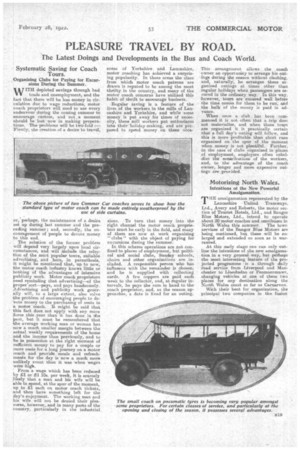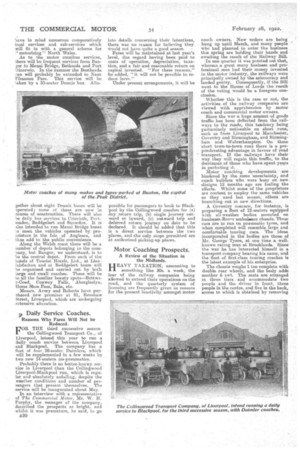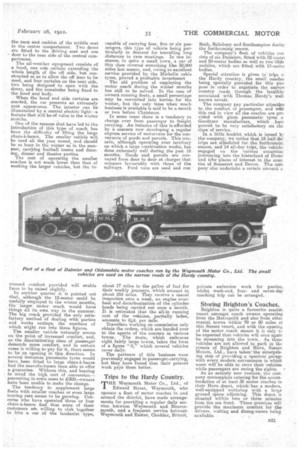PLEASURE TRAVEL BY ROAD.
Page 23

Page 24

Page 25

If you've noticed an error in this article please click here to report it so we can fix it.
The Latest Doings and Developments in the Bus and Coach World.
Systematic Saving for Coach Tours.
Organizing Clubs for Paying for Excursions During the Summer.
WrrH depleted savings through bad trade and unemployment, and the fact that there will be less money in circulation due to wage reductions, motor
coach proprietors will need to use every endeavour during the coming summer to encourage custom, and not a moment should be lost now in making preparations. The problems will be two-fold :— Firstly, the creation of a desire to travel,
or,rperhaps, the maintenance of a desire set up during last summer and the preceding summer; and, secondly, the encouragement of people to devote money to this end.
The solution of the former problem will depend very largely upon local Circumstances, and •will include the selection of the most popular tours, suitable advertising, and here, in parenthesis, it might be mentioned that, up to now, the motor coach industry knows little or nothing of the advantages of intensive publicity work. Motor coach proprietors need reminding that advertising—of the proper sort—pays, and pays handsomely. .Advertising and publicity work generally will, to a large extent, also solve the problem of encouraging people to devote money to the purchasing of seats in a motor ()oath. It might be said that this fact does not apply with any mans force this year than it has done in the past, but it must be remembered that the average working man or woman has now a much smaller margin between the actual weekly requirements of the home and the income than previously, and to be in possession at the right moment of sufficient money to pay for a couple or more seats for a long journey on a motor coach and provide meals and refreshments for the day is now a much more unlikely event than it was when wages 'were high.
From a wage which has been reduced by 21 or 2110s, per week, it is scarcely likely that a man and his wife will be able to spend, at the spur of the moment, up to £.1 each on motor coach tickets, and then have something left for the day's enjoyment. The working man and his wife will not he denied their pleasures, however, and in many parts of the country, particularly in the industrial areas of Yorkshire and Lancashire, motor eoaching has achieved a surprising popularity. In these areas the class from which motor coach patrons are drawn is reputed to be among the most thrifty in the country, and many of the motor coach concerns have utilized this habit of thrift to •encourage business.
Regular saving is a feature of the lives of the workers in the mills of Lancashire and Yorkshire, and while some money is put away for times of necessity, these mill workers put enthusiasm into their holidaymaking, and are prepared to spend money on these arcs
sions. To turn that money into the right channel the motor coach proprietors must be early in the field, and many of them are now at work organizing " clubs " with the object of paying for excursions during the summer.
In this scheme operations are not confined to planes of employment, but political and social clubs, Sunday schools, choirs and other organizations are included. A responsible person who has influence with the remainder is ohose-,n, and he is supplied with collecting cards. A few coppers are paid each week to the collector, and, at regular intervals, he pays the sum in hand to the coach proprietor, and, as the season approaches, a date is fixed for an outing. This arrangement allows the wadi] owner an opportunity to arrange his ont-ings during the season without clashing. and, naturally, he arranges these organized outings at times other than regular holidays when passengers are secured in the ordinary way. In this way, however, tours are ensured well before the time comes for them to be run, and the bulk of the money is paid in advance. When once a club has been commenced it is not often that a trip does not materialize, and when these tours are erganized it is practically certain that a full day's outing will follow, and this is more profitable than short runs organized on the spur of the moment when money is not plentiful. Further, in the case of clubs organized in places of employment, employers often subsidize the contributions of the workers, and, to the advantage of the cowls owner, longer and more expensive outings are provided.
Motorizing North Wales.
Intentions of the New Powerful Amalgamation.
THE amalgamation represented by the Lancashire United Tramways, Ltd., Avery and Roberts the motor section of Tourist Hotels, Lid., and Bangor Blue Motors, Ltd., intend to operate about 20 motor coaches and omnibuses in North Wales this summer. The town services of the Bangor Blue Motors are being continued, but these will be enlarged and extended so soon as is warranted.
At thia early stages one can only outline the intentions of the new amalgamation in a very general way, but perhaps the most, interesting feature of the projected programme is a through daily road service from Liverpool and Manchester to Llandudno or Penmaenmaavr, changing vehicles at one of these two places for any destination along the North Wales coast as far as Carnarvon.
With their bent for organization, the principal two companies in the fusion bave in mind numerous comparatively Local services and sub-services which will fit in with a general scheme for 'motorizing" North Wales.
As to the motor omnibus services, there will be frequent services from Ban;or to Menai Bridge, Bethesda and Part Oinorwic. In the summer the Besthesda mn will probably be extended to Nant Fframeon Pass. This service will be taken by a 30-seater Dennis. bus. Alto getber about eight, Dennis buses will be --iperated; some of these are now in course of construction. There will also be daily bus services to Criccieth, Poriinadoc, Beddgelert and Snowdon. It is also intended to run Menai Bridge buses o meet the vehicles operated by proprietors in the Isle of Angles-ea, and thus add to the public convenience.
Along the Welsh coast there will be a :lumber of depots belonging to the cornoany, but Bangor, we understand, is to be the central depot. From each of the hotels of Tourist Hotels, Ltd., at Llan(airfechan and at Perldgelert tours will be organized and carried out by both large and small coaches. These will be to all the familiar beauty spots—Bet-twov-Coed, Conway Falls, Aberglaslyn, Horse Shoe Pass, Rala etc. Messrs. Avery and Roberts have purchased new premises at Si, .RenShaw Street,. Liverpool, which are undergoing ,,,:ctensive alteration,
Daily Service Coaches.
Reasons Why Fares Will Not be Reduced.
FOR THE third successive season the Collirigwood Transport Co., of Liverpool, intend this year to run a daily coach service between Liverpool and Blackpool. The company ha-s fleet of four 28-seater Daimlers, which will be supplemented in a few weeks by two new 14-seaters ors pneumatics.
Probably there is no better-known service in Liverpool than the CollinEwood. Liverpool-Blackpool run, which is regular and absolutely unfailing, despite the weather conditions and number of passengers that present themselves. The service will be inaugurated about May.
In an interview with a representative of The Commercial Motor, Mr. W. H. Furphy, the manager of the company, described the prospects as bright, and whilst it was premature, he said, to go 1320 into details concerning their intentions, there was no reason for believing they would not have quite a good season.
Fares will be maintained at last year's level, due regard having been paid to costs of operation, depreciation, taxation, and a fair and reasonable return on capital invested. "For these reasons," be added, "it will not be possible to rethee fares."
Under present arrangements, it will be possible for passengers to book to Blackpool by the Collingwood coaches for (a) day return trip, (b) single journey outward or inward, (c) outward, trip and deferred return journey on date to be deolared. It should be added that this is a direct service between the two places, and the only stops permitted are at authorized picking-up places.
Motor Coaching Prospects.
A Review of the Situation in the Midlands.
HEAVY TAXATION, amounting to something like 30s. a week, the Lear of the railway companies being allowed to extend their operations an the road, and the quarterly system of licensing are frequently given as reasons for the present inactivity amongst motor
coach owners. New orders are being hung up until March, and many people who had planned to enter the business this spring are holding their hands and awaiting the result of the Railway Bill. In one quarter it was pointed out that, whereas o great many business and professional men had their money invested in the motor industry, the railways were principally owned by the aristocracy and landed gentry. Consequently, if the Bill went to the Rouse of Lords the result of the voting would be a foregone •conclusion.
Whether this is the ease or not, the activities of the railway companies are viewed -with apprehension -by Motor coach and commercial motor owners.
Since the war a huge amount -of goods traffic has been deflected from the railways to the roads, this tendency being particularly noticeable on short runs, such as from Liverpool to Manchester, Coventry and Birmingham, and Birmingham and Wolverhampton. On these short town-to-town runs there is a preponderating .advantage in favour of road transport. If the railways have their way they will regain this traffic, to the detriment of those who have spent years in perfecting it. Motor coaching developments are hindered by the same uncertainty, and coach builders who were busy on new designs 12 months ago are feeling the effects. Whilst some of the proprietors are content to employ the same vehicles CtS3 they used last season, others are branching out in new directions.
A C-oventry concern, for instance, is preparing a fleet of 12-seaters equipped with all-weather bodies mounted on Sinibeam-Rovr ambulance chassis. These cars are to run on pneumatic tyres, and when completed will resemble large and comfortable touring. cars. The ideas incorporated in the bodies are those of Mr. George Tysoe, at one time a wellknown racing man at Brooklands. Since the war he has interested himself in a transport company bearing his name, and the ,fleet of. first-class touring coaches is the latest example of -his enterprise.
The chassis weighs 1 ton complete with double rear wheels, and the body adds another 6 cwt. The seats are arranged in three tiers and accommodate two people and the driver in front, three people in the centre, and five in the hack, access to which is obtained by removing the !lack and cushion of the middle seatin the centre compartment. Two doors are fitted to the driving seat and one door to the near side of the central compartment.
The all-weather equipment consists of a hood, one side curtain extending the whole length of the off side, but. constructed so as to allow the off door to he used, and four curtains on the near side, two being designed to open with the doors, and the remainder being fixed to the hood and body. When the hood and side curtains are erected, the car presents an extremely neat appearance. The interior can be illuminated by a central electric light—a feature that will be of value in the winter months.
One of the reasons that have led to the introduction of this type of coach has been the difficulty of filling the large chars-a-bancs. The smaller vehicle will be used all the year round, and should be as busy in the winter as in the summer, carrying football teams and dancing, dinner and theatre parties.
The cost of operating the smaller coaches is not much lower than that of working the larger vehicles, but the in
creased comfort provided will enable fares to be raised slightly. In another quarter it is pointed out that, although the 12-seater could be usefully employed in the winter months, the larger motor coach would have things all its own way in the summer. The big coach provided the only satisfactory method of dealing with parties and works outings, the numbers of which might run into three figures. The smaller vehicle naturally scores on the point of increased comfort, and, as the discriminating class of passenger demands more comfort, and in certain cases is willing to pay for it, there seems to be an opening in this direction. In several instances pneumatic tyres would have been fitted to large chars-a-bancs had the manufacturers been able to offer a guarantee. Without this, and bearing in mind the high cost of conversion— amounting in some cases to 2300—owners have been unable to make the change. The tendency to supplement large fleets withsmaller co-aches or even large touring cars Seems to be growing. Concerns who have operated three or four char-k-hanos find that some of their customers are willing to club together to hire a car of the lan•daulet type,
capable of carrying four, five or six passengers, this type of vehicle being particularly in demand for travelling long -distances to race meetings. In one instance, in quite a small town, a car of this class covered something like 30a000 miles last season, and, owing,to excellent service provided by the Michelin cable tyres, proved a profitable investment
The old problem of employing the motor coach during the winter months has still to be solved. In the case of owners running fleets, a small percentage may be converted into lorriea for the winter, but the only time when much business is available is said to be a month or two before Christmas.
In some cases there is a -tendency to change over from passenger to freight carrying. An instance of this is afforded by a concern now developing a regular express service of motorvans for the conveyance of goods and parcels. This concern, although operating over territory on which a large combination works, has done extremely well during the past 18 months. Goods and parcels are conveyed from door to door at charges that compare favourably with those of the railways. Ford vans are used and run
about 17 miles to the gallon of fuel for their weekly journeys, which amount to about 35D miles. They receive a casual inspection once a week, an engine overhaul and decarbonization of the cylinder heads 'being carried out once a month. It is estimated tbat the all-in running cost, of the vehicles, partially laden, amounts to 8ad. per mile.
Travellers working on commission only obtain the orders, which are handed over to the agents of the concern in various towns. The aoute, which embraces eight fairly large towns, takes the form of a figure " 8, ' which several vehicles cover daily. The partners of this business were previously engaged in passenger-carrying, but they have found that their present work pays them better. . •
Trips to the Hardy Country.
THE Weymouth Motor Co., Ltd., of Edward Street, Weymouth, who operate a fleet of motor coaches in and around the district, have made arrangements for providing a regular daily service between Weymouth and Bournemouth, and a frequent service between Weymouth and Exeter, Cheddar, Bristol,
Bath, Salisbury and Southampton durinr the forthcoming season.
The company's fleet of vehicles con sists of six Daimlers, fitted with 22-scatei and 28-seater bodies as well as two Olds mobiles, which are fitted with 14-seatel bodies.
Special attention is given to trips t: the Hardy country, the small coaehei being specially provided for this purpose in order to negotiate the narrow country reads through the localitie: associated with Thomas Hardy's well known novels.
The company pay particular attention to the comfort of passengers, and wit/ this end in view all the coaches are provided with giant pneumatic tyres o Goodyear manufacture, which havt proved to be very satisfactory ort tht class of service.
In a, little booklet which is issued ln the company, we notice that 18 half -da trips are seheduled for the forthcomira season, and 14 all-day trips, the vehicle engaged on the various excursion, journeying into the hinterland of Dorse and intoplaces of interest in the coun ties of Somerset and Devon. The com pa,ny also undertake a certain amount u
private excursion work for parties, whilst week-end, fourand seven-day coaching trip can be arranged.
Storing Brighton's Coaches.
Brighton is quite a favourite seaside resort amongst coach owners operating from the Metropolia and also from othei coastal towns within 70 or 80 miles oi this Sussex resort, and with the opening of the motor coach season it is only Ca he expected that vehicles will once again be streaming into the town. As these vehicles are not allowed to park in the streets of Brighton and Hove, Sussex Motors, Ltd., have taken the enterprising step of providing a spacious garage with every modern convenienee in which users will be able to store their vehicles while passengers are seeing the sights. •
As an entirely new venture, the company contemplate catering for the accommodation of at least 30 motor coaches in their Hove depot, which' has a modern, well-equipped workshop with a large ground space adjoining. This depot is situated within two or three minutes from the s:ea front. These premises will provide the maximum comfort for the drivers, waiting and dining-rooms being as a ilabl e.






























